
In 2024, AI Script Generator | Virbo Guide

AI Script Generator | Virbo Guide
Create videos with an AI script generator
You can complete your video creation using Virbo’s AI Script Generator tool. The specific steps are as follows:
01 Generate your script with AI
Step 1: Add the keywords and basic information for the script you want to prepare. Proceed to the “Key selling points” section for important information in the video.
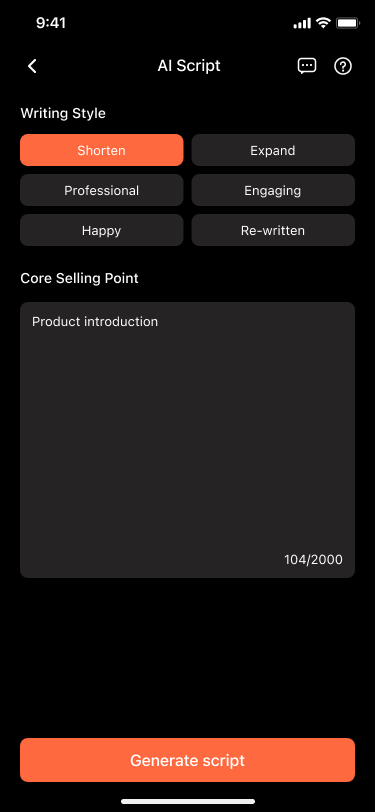
Step 2: After providing all information, select the “Generate script” button on the bottom to start the process.
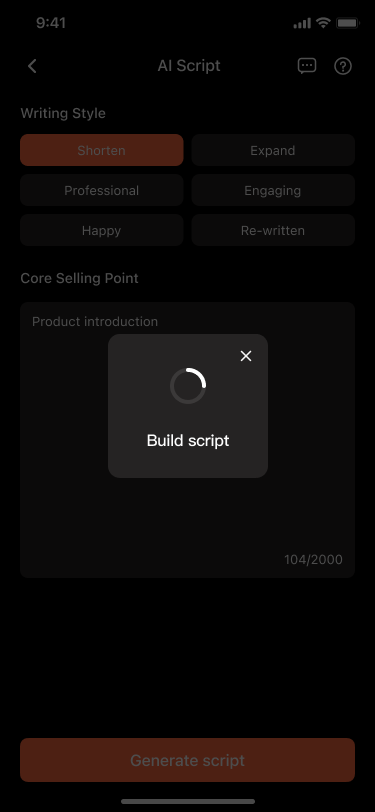
Step 3: It takes time to complete, but once finished, the script will be displayed on the next screen. You can make specific edits to the script as desired. Then, proceed to select the “Create video” button to generate an AI video based on the script.
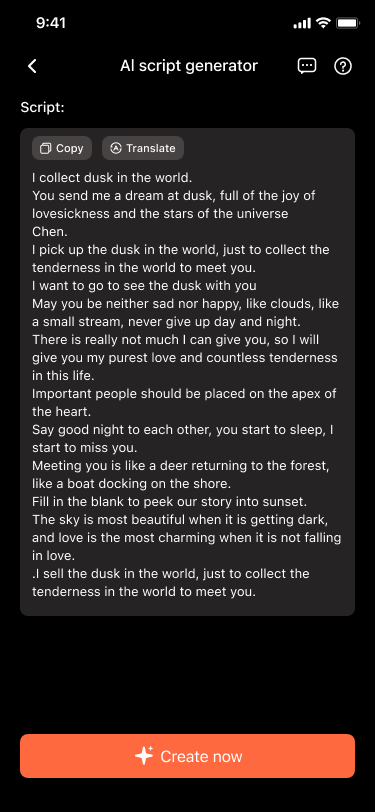
02 Create AI videos based on the script
Step 1: Upon clicking the “Create video” button, you will be directed to the AI video creation screen, where you can choose your preferred avatar.
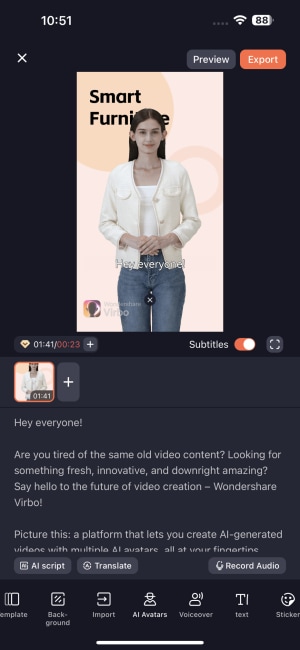
Step 2: At the same time, you can customize the template style, video background, voiceover , and text style. Additionally, you can add stickers and music. If you are satisfied with the result, you can proceed to export the final video.
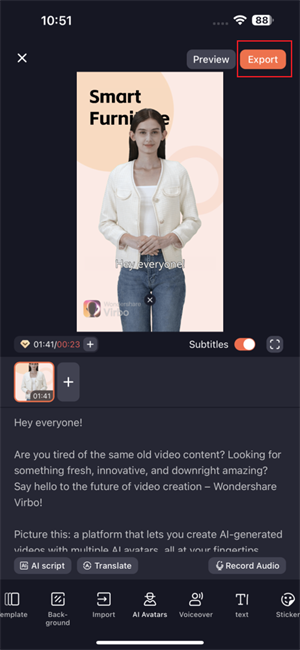
Note
Please note that free users are limited to exporting videos of up to 30 seconds in duration. Should you exceed this limit, upgrading to the premium version is required to export longer videos.
01 Generate your script with AI
Step 1: Add the keywords and basic information for the script you want to prepare. Proceed to the “Key selling points” section for important information in the video.

Step 2: After providing all information, select the “Generate script” button on the bottom to start the process.

Step 3: It takes time to complete, but once finished, the script will be displayed on the next screen. You can make specific edits to the script as desired. Then, proceed to select the “Create video” button to generate an AI video based on the script.

02 Create AI videos based on the script
Step 1: Upon clicking the “Create video” button, you will be directed to the AI video creation screen, where you can choose your preferred avatar.

Step 2: At the same time, you can customize the template style, video background, voiceover , and text style. Additionally, you can add stickers and music. If you are satisfied with the result, you can proceed to export the final video.

Note
Please note that free users are limited to exporting videos of up to 30 seconds in duration. Should you exceed this limit, upgrading to the premium version is required to export longer videos.
What Is an AI Avatar? | Wondershare Virbo Glossary
Part 1. What exactly is an AI avatar?
AI avatar refers to a digital representation or embodiment of an individual that is created and controlled using artificial intelligence techniques. It is an interactive virtual character that can simulate human-like behaviors, emotions, and interactions.
AI avatars are often designed to resemble human appearance and can be used in various applications, such as virtual assistants, customer service representatives, virtual companions, or virtual reality environments.
AI algorithms and technologies, including natural language processing, computer vision, and machine learning power these avatars. They can understand and respond to user inputs, engage in conversations, express emotions through facial expressions and gestures, and provide personalized interactions.
AI avatars aim to enhance human-computer interactions by creating a more engaging and immersive experience. They can be utilized in diverse fields, including entertainment, education, healthcare, and more, to provide interactive and personalized experiences to users.
Part 2. What’s the characteristics and advantages of AI avatars?
Compared to traditional avatar representations, AI avatars are more “human-like.” Their most notable characteristic is their possession of human-like appearance. AI avatars are designed to resemble human beings in their appearance, including facial features, expressions, and body movements. This helps create a sense of familiarity and relatability for users. Hence, they are interactive and responsive, as well as capable of understanding and responding to user inputs, whether through text, speech, or gestures. They can engage in conversations, answer questions, and provide relevant information or assistance.
Meanwhile, AI avatars also have the ability to learn adaptively and can learn from user interactions and adapt their responses over time. They can improve their understanding, language capabilities, and behavior based on user feedback, making their interactions more effective and tailored to individual preferences.
Moreover, AI avatars have great advantages, such as 24/7 availability and consistency. They can be available round the clock, providing assistance and information anytime. This ensures continuous support and access to services without limitations imposed by human availability. In the meantime, they can maintain a consistent tone, language, and behavior across interactions, eliminating variations that may occur with human operators.
Part 3. What’s the application area of AI avatars?
AI avatars have a wide range of applications across various fields. Some common areas where AI avatars are used include:
1. Virtual Assistants
AI avatars can serve as virtual assistants, providing information, answering questions, and assisting with tasks in a conversational manner. Examples include Apple’s Siri, Amazon’s Alexa, and Google Assistant.
2. Customer Service
AI avatars are utilized in customer service applications, where they can engage with customers, handle inquiries, and provide support in a more interactive and personalized way. They can assist with product recommendations, troubleshooting, and order processing.
3. Education
AI avatars are used in educational applications to create interactive learning experiences. They can act as virtual tutors, guiding students through lessons, providing explanations, and adapting to individual learning needs.
4. Entertainment
AI avatars play a role in entertainment applications such as virtual reality (VR) and video games. They can be characters within a game or interactive companions that respond to user actions and emotions, creating immersive and engaging experiences.
5. Healthcare
AI avatars find applications in healthcare for patient education, therapy, and mental health support. They can provide information about medical conditions, assist with medication reminders, and offer emotional support.
6. Training and Simulation
AI avatars are used in training simulations for various industries, including military, aviation, and healthcare. They can replicate realistic scenarios, allowing trainees to practice skills and decision-making in a safe and controlled environment.
7. Social Media and Chat Applications
AI avatars are integrated into social media platforms and chat applications, providing users with personalized interactions, recommendations, and entertainment.
The applications of AI avatars are continually expanding as technology advances, offering new possibilities for interactive and immersive experiences in various domains.
Part 1. What exactly is an AI avatar?
AI avatar refers to a digital representation or embodiment of an individual that is created and controlled using artificial intelligence techniques. It is an interactive virtual character that can simulate human-like behaviors, emotions, and interactions.
AI avatars are often designed to resemble human appearance and can be used in various applications, such as virtual assistants, customer service representatives, virtual companions, or virtual reality environments.
AI algorithms and technologies, including natural language processing, computer vision, and machine learning power these avatars. They can understand and respond to user inputs, engage in conversations, express emotions through facial expressions and gestures, and provide personalized interactions.
AI avatars aim to enhance human-computer interactions by creating a more engaging and immersive experience. They can be utilized in diverse fields, including entertainment, education, healthcare, and more, to provide interactive and personalized experiences to users.
Part 2. What’s the characteristics and advantages of AI avatars?
Compared to traditional avatar representations, AI avatars are more “human-like.” Their most notable characteristic is their possession of human-like appearance. AI avatars are designed to resemble human beings in their appearance, including facial features, expressions, and body movements. This helps create a sense of familiarity and relatability for users. Hence, they are interactive and responsive, as well as capable of understanding and responding to user inputs, whether through text, speech, or gestures. They can engage in conversations, answer questions, and provide relevant information or assistance.
Meanwhile, AI avatars also have the ability to learn adaptively and can learn from user interactions and adapt their responses over time. They can improve their understanding, language capabilities, and behavior based on user feedback, making their interactions more effective and tailored to individual preferences.
Moreover, AI avatars have great advantages, such as 24/7 availability and consistency. They can be available round the clock, providing assistance and information anytime. This ensures continuous support and access to services without limitations imposed by human availability. In the meantime, they can maintain a consistent tone, language, and behavior across interactions, eliminating variations that may occur with human operators.
Part 3. What’s the application area of AI avatars?
AI avatars have a wide range of applications across various fields. Some common areas where AI avatars are used include:
1. Virtual Assistants
AI avatars can serve as virtual assistants, providing information, answering questions, and assisting with tasks in a conversational manner. Examples include Apple’s Siri, Amazon’s Alexa, and Google Assistant.
2. Customer Service
AI avatars are utilized in customer service applications, where they can engage with customers, handle inquiries, and provide support in a more interactive and personalized way. They can assist with product recommendations, troubleshooting, and order processing.
3. Education
AI avatars are used in educational applications to create interactive learning experiences. They can act as virtual tutors, guiding students through lessons, providing explanations, and adapting to individual learning needs.
4. Entertainment
AI avatars play a role in entertainment applications such as virtual reality (VR) and video games. They can be characters within a game or interactive companions that respond to user actions and emotions, creating immersive and engaging experiences.
5. Healthcare
AI avatars find applications in healthcare for patient education, therapy, and mental health support. They can provide information about medical conditions, assist with medication reminders, and offer emotional support.
6. Training and Simulation
AI avatars are used in training simulations for various industries, including military, aviation, and healthcare. They can replicate realistic scenarios, allowing trainees to practice skills and decision-making in a safe and controlled environment.
7. Social Media and Chat Applications
AI avatars are integrated into social media platforms and chat applications, providing users with personalized interactions, recommendations, and entertainment.
The applications of AI avatars are continually expanding as technology advances, offering new possibilities for interactive and immersive experiences in various domains.
What Is an AI Video Maker?
Part 1.What is an AI video maker?
AI video maker refers to a video creation tool that utilizes artificial intelligence (AI) technology to automate or enhance various aspects of the video production process. These tools often integrate machine learning algorithms and computer vision techniques to perform tasks such as video editing, scene recognition, automated video generation, voiceover synthesis, and more.
With AI video makers, users can create professional-looking videos more efficiently and with less manual effort. These tools can analyze raw video footage, apply filters, add visual effects, generate subtitles, and even suggest relevant music or soundtracks based on the video’s content. Some AI video makers can also create videos from scratch using provided assets, such as images and text, transforming them into dynamic and engaging visual presentations.
The use of AI in video creation has significantly simplified the process and made it accessible to individuals and businesses without specialized video editing skills. As AI technology advances, AI video makers will likely become even more sophisticated, allowing for more creative and innovative video productions.
Part 2. Any differences between an AI video maker and a generator?
Yes, there is a difference between an AI video maker and an AI video generator, although they are related concepts.
1. AI Video Maker
An AI video maker is a software tool or platform that leverages artificial intelligence (AI) technologies to assist in video creation and editing. It provides users various automated features and tools to streamline video production. AI video makers typically offer functionalities such as automatic video editing, scene recognition, visual effects, subtitle generation, voiceover synthesis, and music suggestions. These tools are designed to make video creation more accessible and efficient for users, regardless of their level of expertise in video editing.
2. AI Video Generator
On the other hand, an AI video generator is an AI system that can autonomously produce videos from scratch without human intervention. These generators use AI algorithms, often powered by deep learning techniques, to create videos based on specific input parameters or data. For example, an AI video generator could take images, text, or audio inputs and use them to generate a complete video sequence. The generated videos may be entirely fictional or based on real-world data, depending on the system’s design and purpose.
In summary, the main difference lies in their primary functions: an AI video maker assists users in the video creation process. In contrast, an AI video generator autonomously produces videos without human intervention. Both concepts leverage AI technology to enhance video-related tasks, but they serve different purposes and cater to other use cases. challenges they may present.
Part 1.What is an AI video maker?
AI video maker refers to a video creation tool that utilizes artificial intelligence (AI) technology to automate or enhance various aspects of the video production process. These tools often integrate machine learning algorithms and computer vision techniques to perform tasks such as video editing, scene recognition, automated video generation, voiceover synthesis, and more.
With AI video makers, users can create professional-looking videos more efficiently and with less manual effort. These tools can analyze raw video footage, apply filters, add visual effects, generate subtitles, and even suggest relevant music or soundtracks based on the video’s content. Some AI video makers can also create videos from scratch using provided assets, such as images and text, transforming them into dynamic and engaging visual presentations.
The use of AI in video creation has significantly simplified the process and made it accessible to individuals and businesses without specialized video editing skills. As AI technology advances, AI video makers will likely become even more sophisticated, allowing for more creative and innovative video productions.
Part 2. Any differences between an AI video maker and a generator?
Yes, there is a difference between an AI video maker and an AI video generator, although they are related concepts.
1. AI Video Maker
An AI video maker is a software tool or platform that leverages artificial intelligence (AI) technologies to assist in video creation and editing. It provides users various automated features and tools to streamline video production. AI video makers typically offer functionalities such as automatic video editing, scene recognition, visual effects, subtitle generation, voiceover synthesis, and music suggestions. These tools are designed to make video creation more accessible and efficient for users, regardless of their level of expertise in video editing.
2. AI Video Generator
On the other hand, an AI video generator is an AI system that can autonomously produce videos from scratch without human intervention. These generators use AI algorithms, often powered by deep learning techniques, to create videos based on specific input parameters or data. For example, an AI video generator could take images, text, or audio inputs and use them to generate a complete video sequence. The generated videos may be entirely fictional or based on real-world data, depending on the system’s design and purpose.
In summary, the main difference lies in their primary functions: an AI video maker assists users in the video creation process. In contrast, an AI video generator autonomously produces videos without human intervention. Both concepts leverage AI technology to enhance video-related tasks, but they serve different purposes and cater to other use cases. challenges they may present.
Everything You Want To Know About Kapwing Video Translation
Effective communication extends beyond language barriers. As content creators strive for global reach, video translation takes center stage. Kapwing is one such Video Translation tool. It’s a versatile tool designed to bring down linguistic boundaries and elevate the impact of visual storytelling. In this article, we will delve into the key aspects of Kapwing, providing an insightful guide on its video translator, usage, and explore an alternative platform that complements or rivals its capabilities. So, join us as we unravel everything you need to know about theKapwing translate video tool.
Part 1: What is Kapwing
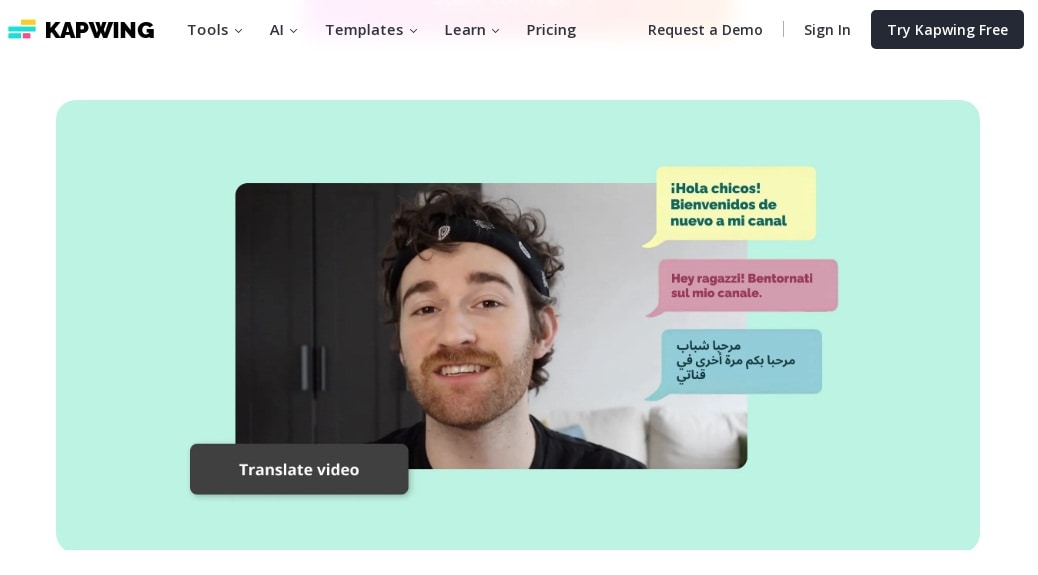
Kapwing is an online video editing platform. It lets you create, combine, and edit multimedia content. You can use it for creating videos, managing images, and making GIFs. It offers a wide range of tools and features for customizing visual content, such as video editing, image enhancements, subtitle/transcription generator, Kapwing video translator, meme maker, and much more.
Kapwing has a very user-friendly interface with beginners in mind. That’s why even people with no prior experience in graphics design or video editing can use it seamlessly to create unique content, making it a popular option for social media managers, content creators, and digital marketers alike.
Unique Features of Kapwing
- Drag and drop functionality : Working with Kapwing is incredibly simple. Just drag and drop your media into the Kapwing editor and start editing from the browser. No need to download anything.
- Excellent customization features : Whether you’re working with text, audio, or video, Kapwing offers a host of customization features such as adding text, text color, size, images and audio, etc.
- Add Subtitles and captions : With Kapwing translate you can easily generate captions and subtitles. After that, add them to your videos, making them more engaging.
- Excellent video editing tools : Trimming, cropping, filtering, Cutting – Kapwing offers a range of video editing tools that make post-production a real breeze.
- Extensive Video format support : Kapwing can work with an extensive range of video file formats, including but not limited to, AVI, MOV, FLV, MP4, WEBM, GIF, and 3GP.
What is the Kapwing Video Translate Tool
Kapwing has a fantastic instant video translation tool. It uses the latest AI technology to auto-transcribe your content, saving both time and effort. You can also use Kapwing Translate to translate subtitles into 70 languages of the world, helping you reach a global audience. Transcribing is easy with just a few clicks. You can translate video, as well as audio and text. Moreover, you can customize subtitles using fonts, transitions, filters, and animations, and if you want to get the subtitle file to use with a video editor, you can do so as well. Kapwing supports subtitle downloads in SRT, TXT, or VTT file types.
Part 2: How to Use Kapwing Video Translator To Translate A Video
Below is a step-by-step process for the Kapwing translate video tool.
Step 1
– Go to the officialKapwing video translator tool by following the link below:
https://www.kapwing.com/studio/editor/subtitles
It takes you directly to the online editor. No need to download any app/software or sign up with your account.
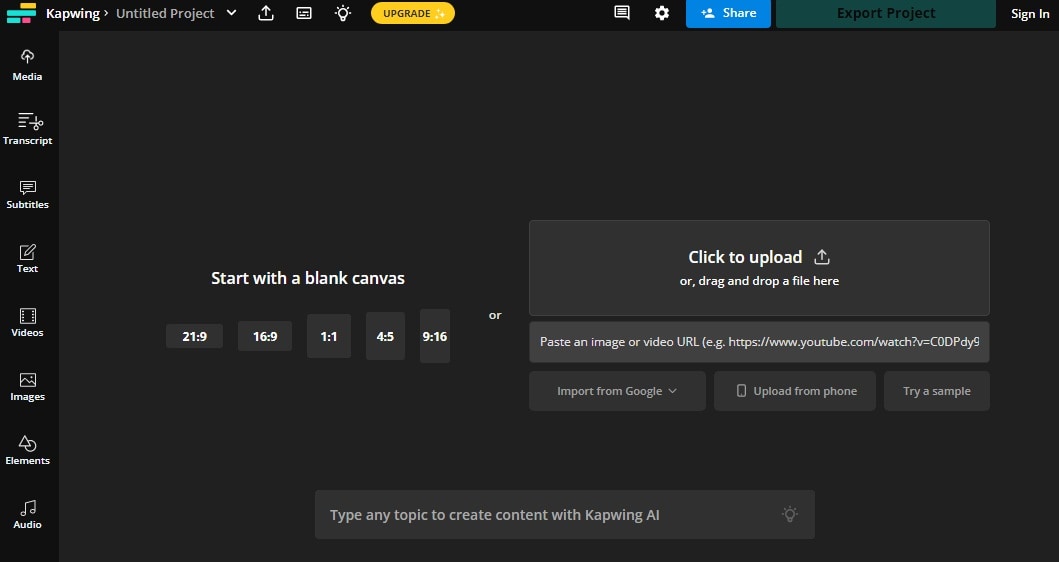
Step 2
- Upload your video by clicking on the box or dragging and dropping your content file. Below is what the Kapwing interface looks like when you upload a video.
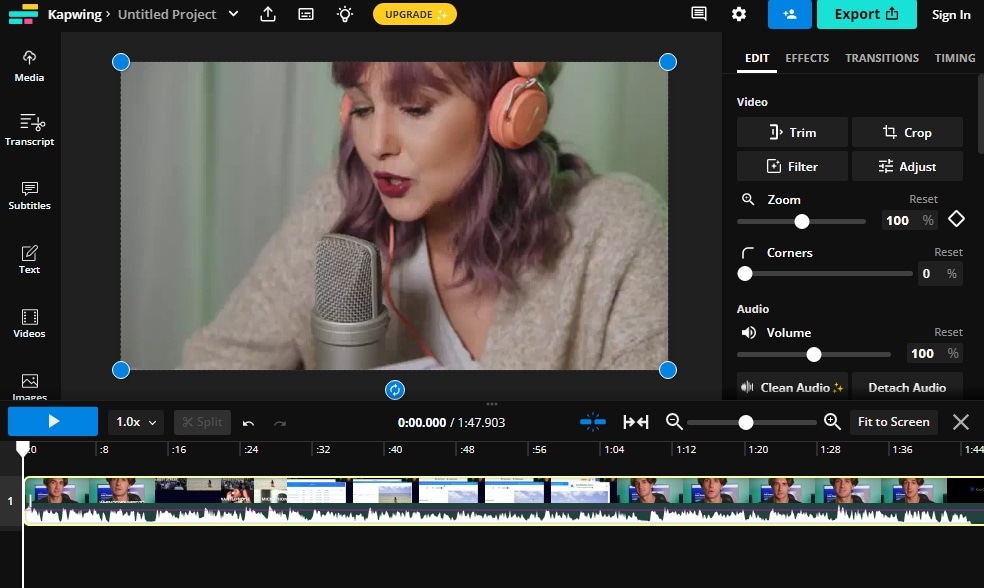
Step 3
– Click on theSubtitle option in the top left corner. Kapwing will show a list of transcription options.
Step 4
– Next, select your target language.
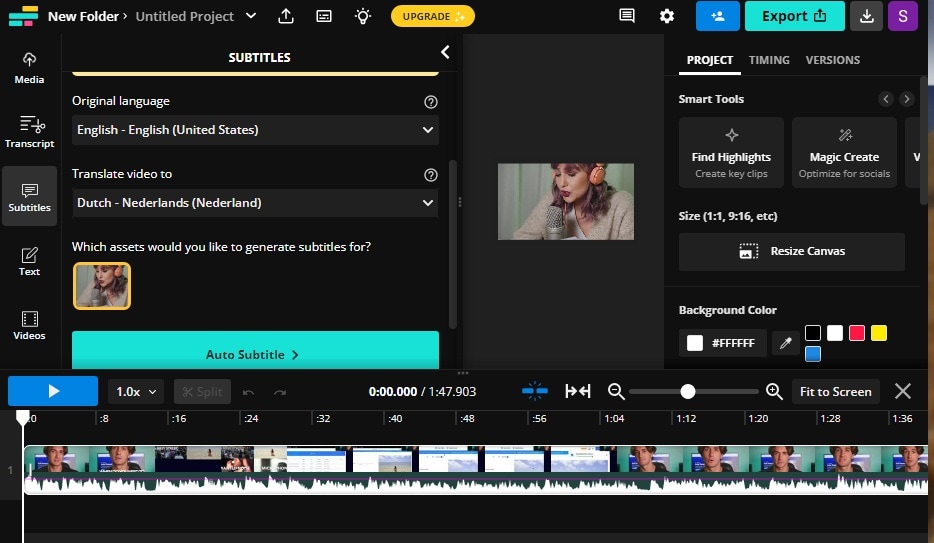
For this tutorial, we are translating an English video to Dutch as you can see above.
Step 5
– Click onAuto Subtitle
Kapwing will start automatically translating your video. It may take some time. Longer videos take more time to translate than shorter ones.
Step 6
– Lastly, check final settings
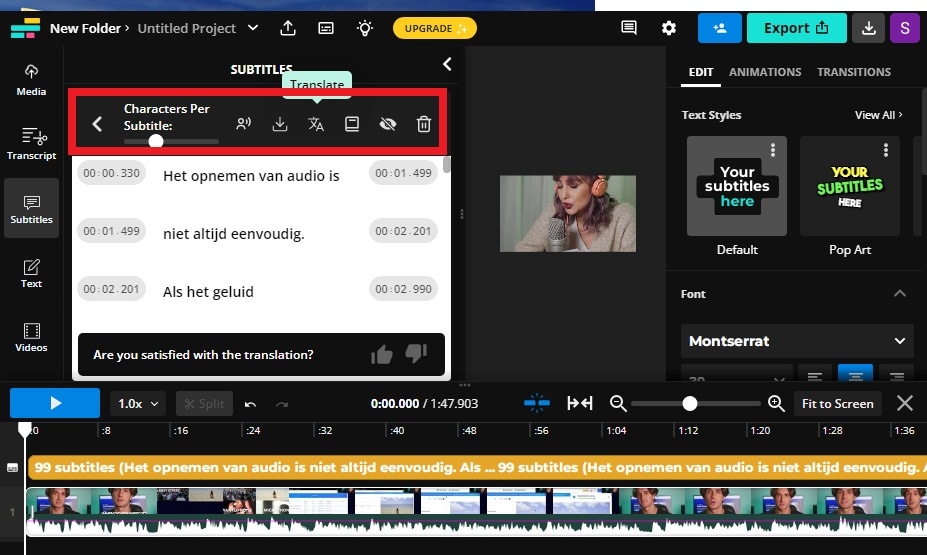
Once you get the translated subtitles, you can add voice dubbing, download the SRT file, further translate these subtitles into other languages, add custom spelling, and do much more using the options in the red box seen above.
That’s all. Pretty easy, right? This is how you use theKapwing video translator .
Part 3: Best Alternative to Kapwing: Wodnershare Virbo
While Kapwing is a great platform for video editing online, some other platforms provide similar features with better AI tools. One such notable tool is Wondershare Virbo .
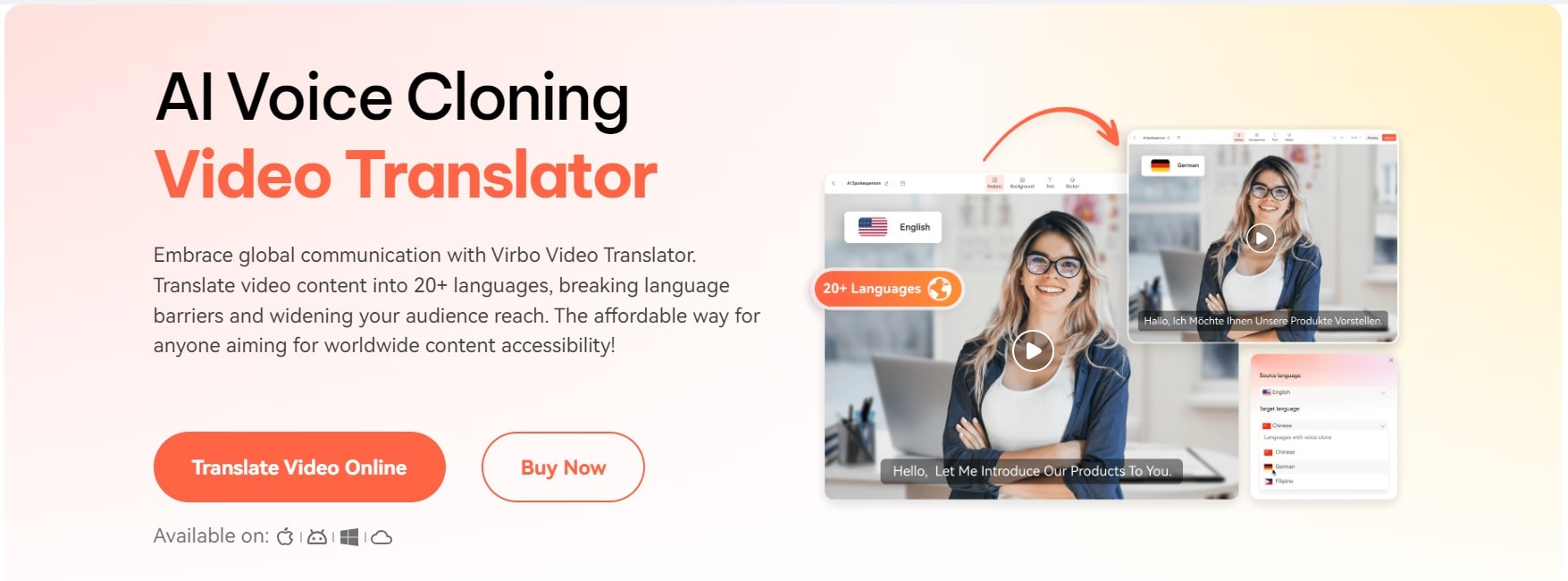
Generate Voice Online Download APP Now Free Download
Use Virbo to Generate AI Videos or Translate Your Audio/Video Content
Virbo is a fantastic Kapwing alternative that steps it up a notch. With Kapwing you can convert text into professional-grade talking videos in over 300 languages, voices, and dialects. As far as its video translator is concerned, Virbo can easily translate any video into 20+ top languages of the world, including English, Chinese, French, German, Japanese, Korean, Russian, and Hindi among others.
Virbo: Unique Features
Below are some other unique features of Virbo that you don’t easily find in any other AI translation tool.
- Auto generate script – Eliminates the need to write script manually and ensures consistency.
- Lip-sync Precision – Provides harmonious and synchronized expressions. [New feature coming soon]
- AI Cloning Voices – Provides realistic AI voices to inject some emotion into your videos
- Soundtrack Reserved – To enhance user engagement and make your content more appealing
Use Wondershare Virbo to Translate Videos into Any Language
Let’s learn how to translate video into any language using Wondershare Virbo. You can use Wondershare Virbo in three ways: the online app, the desktop app, and a mobile app with the same set of features.
Using Wondershare Virbo Online
Step 1: On the Wondershare Virbo Online website, start by signing in with a Google/ Facebook/ Twitter account/ Apple ID or your Wondershare Account. If you do not have a Wondershare Account, start by creating a new one.
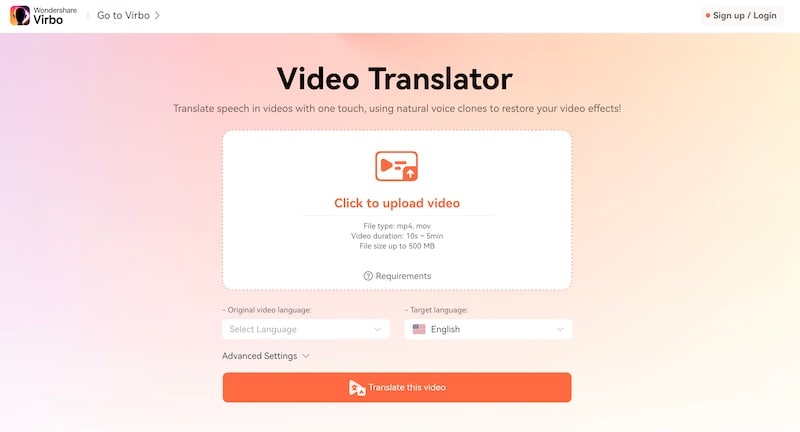
Step 2: Upload the video you want to translate. Note that your videos are safe. Wondershare does not sell your data. Next, select the original video language and the language you want to translate into (target language). At this point, you can click “Translate this video” to translate the video and save it. However, the next step talks about the advanced features of Virbo.
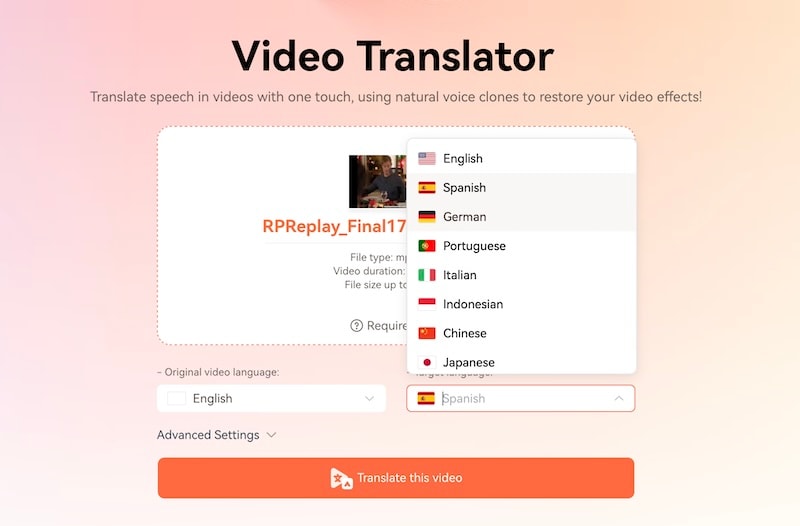
Step 3: Click Translate this video if you want to translate the video with no further processing. However, Wondershare Virbo comes with some advanced features you might find useful.
ADVANCED FEATURES
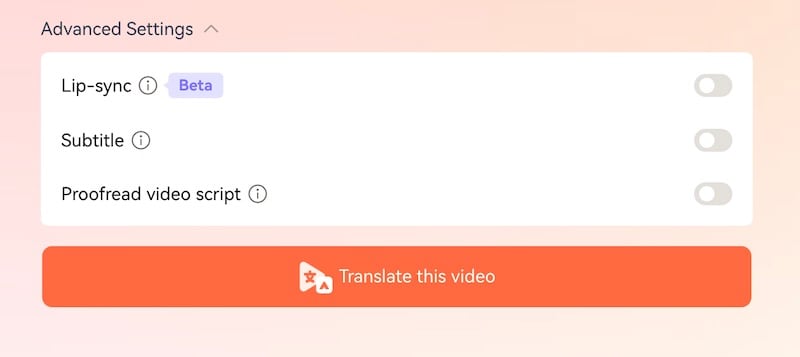
- If you want to add lip-sync to the translated video, toggle the Lip-sync option. This option uses the power of AI to lip-sync the videos into the translated language! Wow!
- The subtitle option can be used to bake the translated subtitles into the video. It works if there are no subtitles in the input video.
- Proofread Video Script proofreads the video script to translate the video more accurately.
Translate Video Online Download APP Now Free Download
Using Wondershare Virbo Desktop App
Step 1: Launch Wondershare Virbo and select Video Translator.
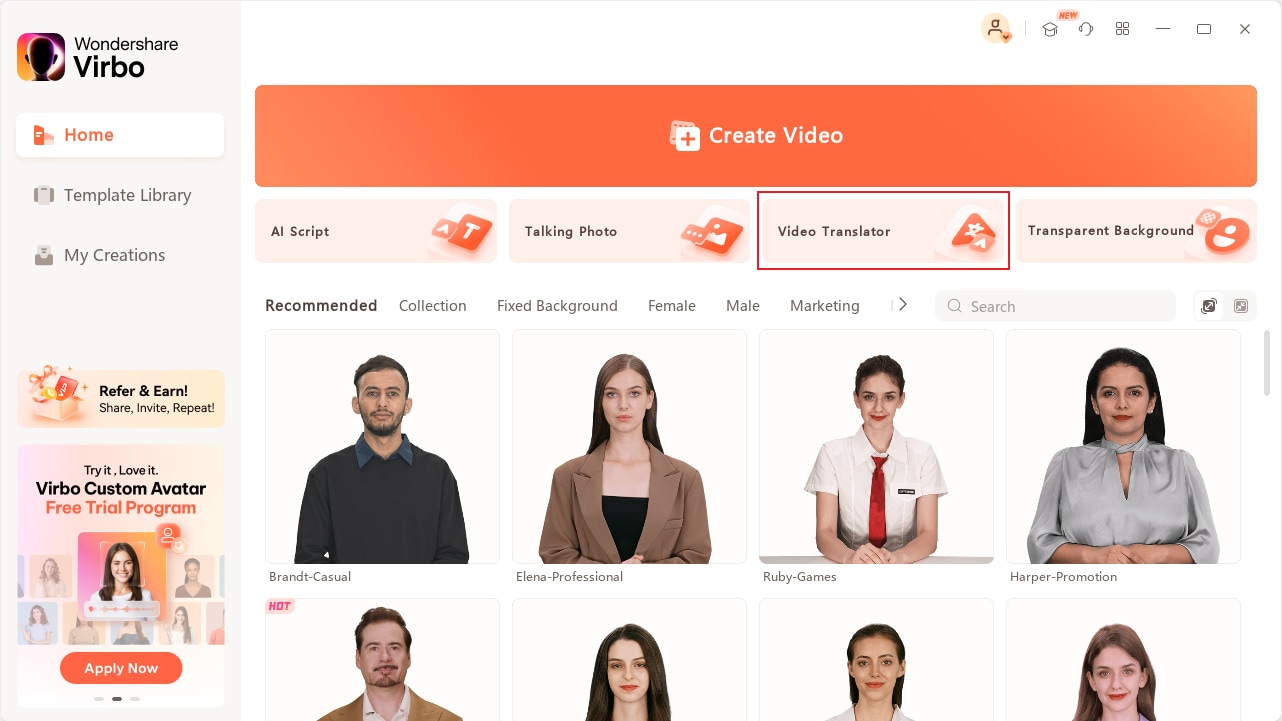
Step 2: Upload a video to Virbo. Note that there are some limitations to the input video, as mentioned below.
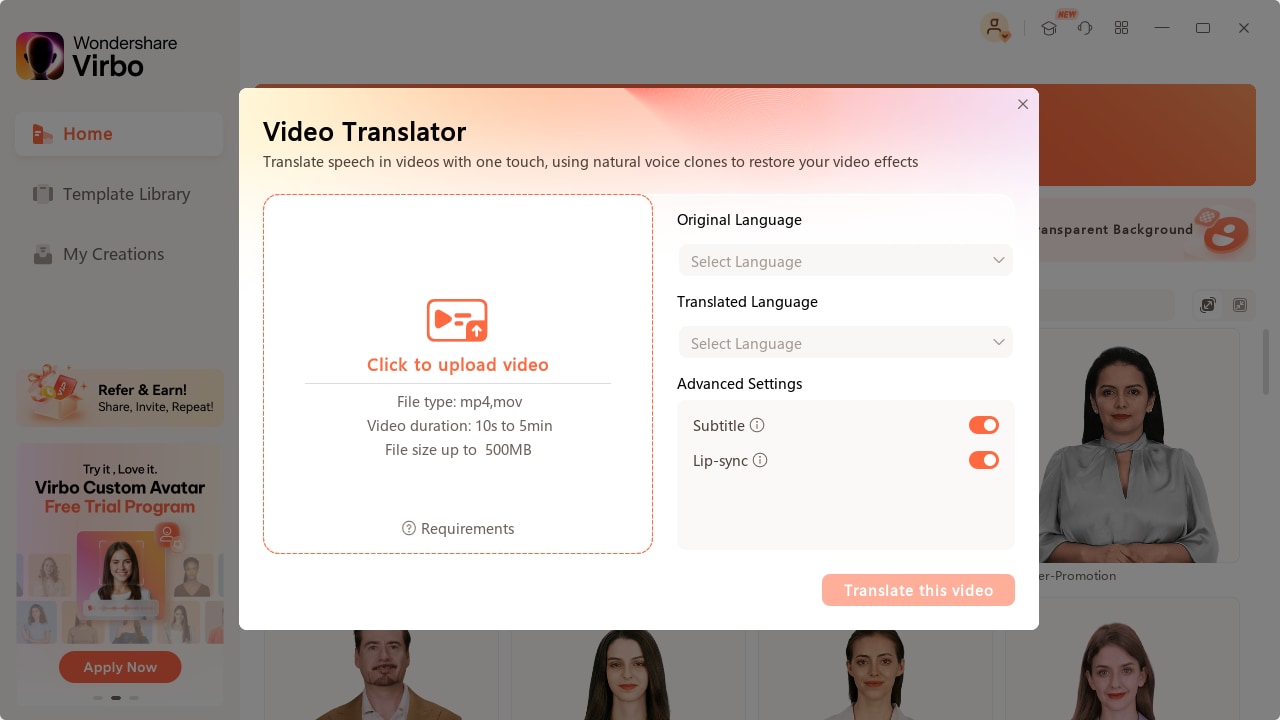
INPUT REQUIREMENTS
Be mindful that your video adheres to the following conditions for best results.
- Videos should be minimum 10 seconds and maximum 5 minutes long.
- Virbo will translate only authentic human voices.
Check the original language and select the target translation language.
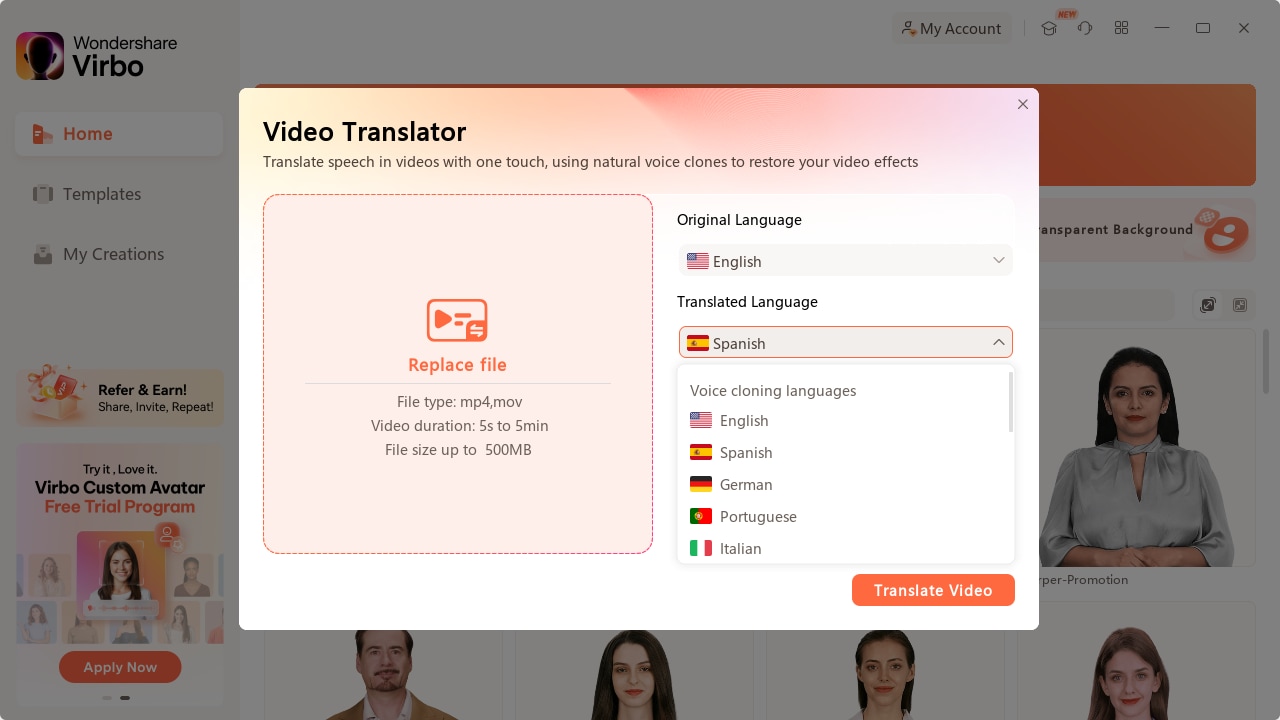
ADVANCED FEATURES
Wondershare Virbo comes with advanced features that elevate and enhance your video translation experience. Using the power of AI, Wondershare Virbo can be used to translate and add subtitles, too! The voice in the translated languages can also match the lip movements of the video speaker in the original language.
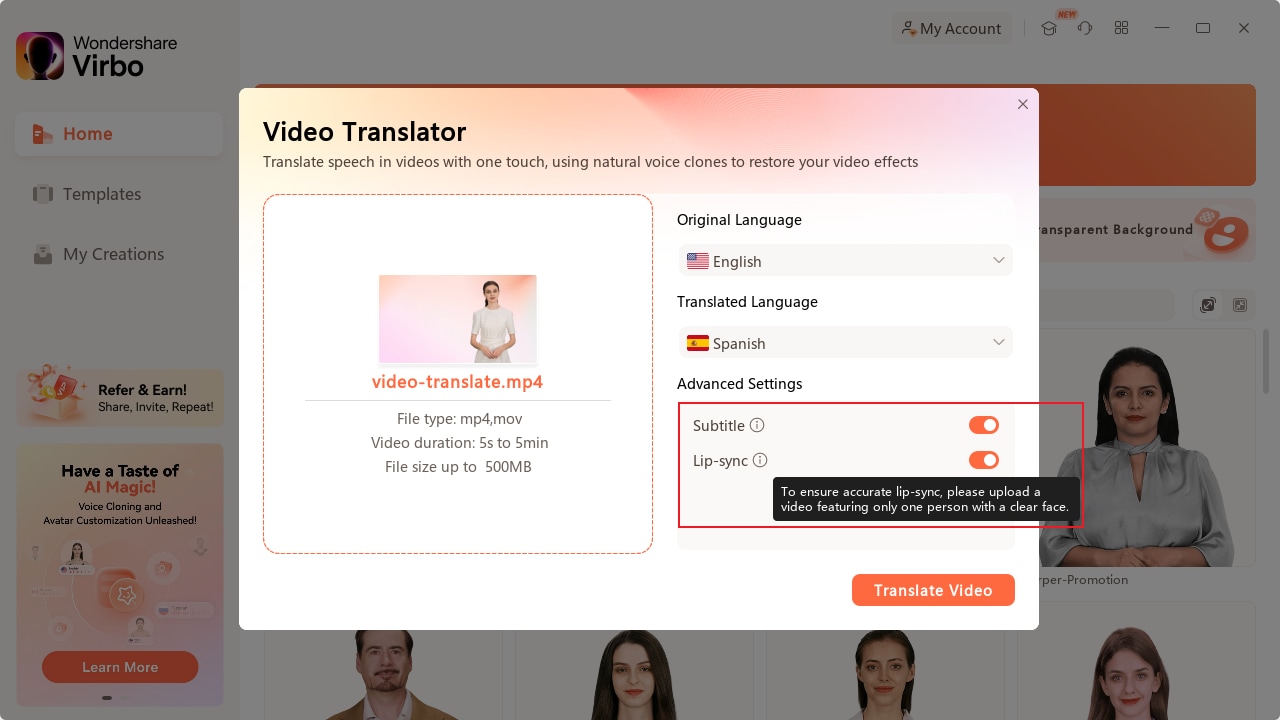
Step 3: Click Translate and upon completion, save the video to the computer. That’s all it takes to quickly translate video with Wondershare Virbo!
Translate Video Online Download APP Now Free Download
Part 4: Kapwing and Wondershare Virbo: Differences At A Glance
Here are the differences between Wondershare Virbo and Kapwing.
| FEATURES | Kapwing | Wondershare Virbo |
|---|---|---|
| Easy to Understand | Yes | Yes |
| Easy to Use | Yes | Yes |
| Add Subtitles | Yes | Yes |
| Translate Video | Yes | Yes |
| Translate Subtitles | Yes | Yes |
| Automatic Script Generation | Not Supported | Yes |
| Precise Lip Sync in Translation | Not Supported | Yes |
| AI Voice Cloning | Not Supported | Yes |
| Reserve Soundtrack | Not Supported | Yes |
As you can see, Kapwing is an excellent tool that anyone would find easy to use and sufficient, but for more demanding and advanced users who need more options and better quality of video translation thanks to advanced features such as lip sync in translated video and keeping background score intact, the winner is undoubtedly Wondershare Virbo.
Translate Video Online Download APP Now Free Download
Conclusion
As you must have noticed, Kapwing is a very versatile and user-friendly online editor. It provides a range of features and makes content creation a real breeze.Kapwing subtitle translator , in particular, helps make your content suitable for global audiences. But, we have one better alternative - Virbo. Whether you’re creating AI talking videos, translating your video online into different languages, or adding subtitles, Virbo offers a proficient workflow. Thanks to its extensive AI editing features, flexibility of settings, and social media integration, Virbo emerges as a powerful Kapwing alternative for content creators who want to add some extra oomph to their content and reach a wider audience.
Translate Video Online Download APP Now Free Download
A Guide on Starting Private Live Streams on YouTube
In today’s digital age, live streaming has become a powerful tool for connecting with audiences in real-time. This method has especially been crucial for businesses looking to get into live selling or gamers wanting to stream their games. But say, for example, that you want to keep your stream private, accessible only to select viewers; how do you do that?
Here’s where private live streaming comes in. This option allows you to share your content with specific individuals, ensuring a more intimate and controlled environment. This guide will teach you how to set upprivate YouTube streams and give you special tips to let AI help you with your streams with Wondershare Virbo.

Part 1: What Do You Need To Get Started With YouTube Private Live Streaming?
Before diving into the exciting world of private live streaming, here is the equipment to ensure a smooth and seamless experience.
- YouTube account. First things first, you’ll need a YouTube account. This is your gateway to the platform and your key to unlock the world of live streaming.
- A capable PC. Next, prepare your PC and the command center for your private stream. While specific requirements vary depending on the complexity of your stream, here are some general recommendations:
- Processor: Intel Core i5 or equivalent (or newer)
- RAM: 8GB or more
- Graphics Card: Dedicated GPU recommended for enhanced performance
- Internet Connection: A stable and fast internet connection with sufficient upload bandwidth (consider at least 3 Mbps for standard definition)
- A streaming tool. Now, you’ll need a streaming tool to capture your video and audio and send it live to YouTube.Wondershare Virbo is recommended, especially for live-selling purposes. Other options include OBS and similar stream apps for other purposes.
With these essential elements in place, you’re on your way to launching your private YouTube adventure.
Part 2: How To Start a Private YouTube Live Stream?
Ready to share your talents or ideas with a select audience? Dive into the steps to create aprivate live stream on YouTube by following the guide below. It’s pretty straightforward.
- Step 1: Access YouTube Studio.Head to your YouTube Studio page (studio.youtube.com) and log in using your Google account linked to your YouTube channel.
- Step 2: Prepare for live streaming**.** ClickCreate in the top left corner of the Studio dashboard, and selectGo Live from the dropdown menu. Alternatively, click the camera icon next to your profile picture and chooseGo Live.

- Step 3: Now, set your visibility. Before starting your broadcast, ensure your stream is private. Under theVisibility setting, click the dropdown menu and choosePrivate . This option restricts viewership to individuals you specifically invite.

- Step 4: There are two methods existing for inviting viewers:
- Email Invitations: Click onShare Privately and enter the email addresses of individuals you wish to grant access. You can also choose to notify them via email.
- Link sharing: Although not recommended for complete privacy, you can copy the stream link and share it directly with trusted individuals. Remember, anyone with the link can access the stream, even uninvited guests.

- Step 5: Once everything is set and your viewers are invited, clickGo Live to launch your private YouTube stream. Remember, only invited individuals using their YouTube accounts can view your content.
Additional Tips for Private YouTube Live Streams
Here are some additional tips that you can follow before starting aprivate YouTube stream :
- Test streaming. Consider using a test stream before inviting viewers to ensure everything runs smoothly.
- Giving guidelines to your viewers. Encourage guests to use their YouTube accounts for optimal viewing experience and security. Further, you can add house rules, especially for more intimate streams or live selling/auctions.
- Exploring advanced privacy settings. Explore advanced privacy settings within YouTube Studio for further control over viewer permissions.
- Using AI . Tools like Wondershare Virbo can help integrate AI into your private YouTube streams. This way, you won’t always have to glue your eyes on your stream. Discover more about this feature in the following section.
By following these steps and keeping privacy in mind, you can effectively host engaging live streams on YouTube, connecting with your chosen audience in a controlled and intimate setting. Remember to personalize your content, interact with your viewers, and enjoy the unique experience of private live streaming.
Part 3: Breaking the Limitations of Live Streams With Wondershare Virbo
Live streaming constantly evolves, offering creators new ways to connect with audiences. While traditional live streams require your physical presence, imagine having an engaging and interactive stream running 24/7, even when you’re not there. This is great, especially forprivate YouTube streams , where the need to engage the select viewers becomes more apparent.
Enter Wondershare Virbo , a revolutionary tool that leverages AI to create realistic and captivating live streams around the clock.
Introducing Wondershare Virbo
Gone are the days of relying solely on manual effort to keep your audience engaged. Virbo Live transcends these limitations, offering:
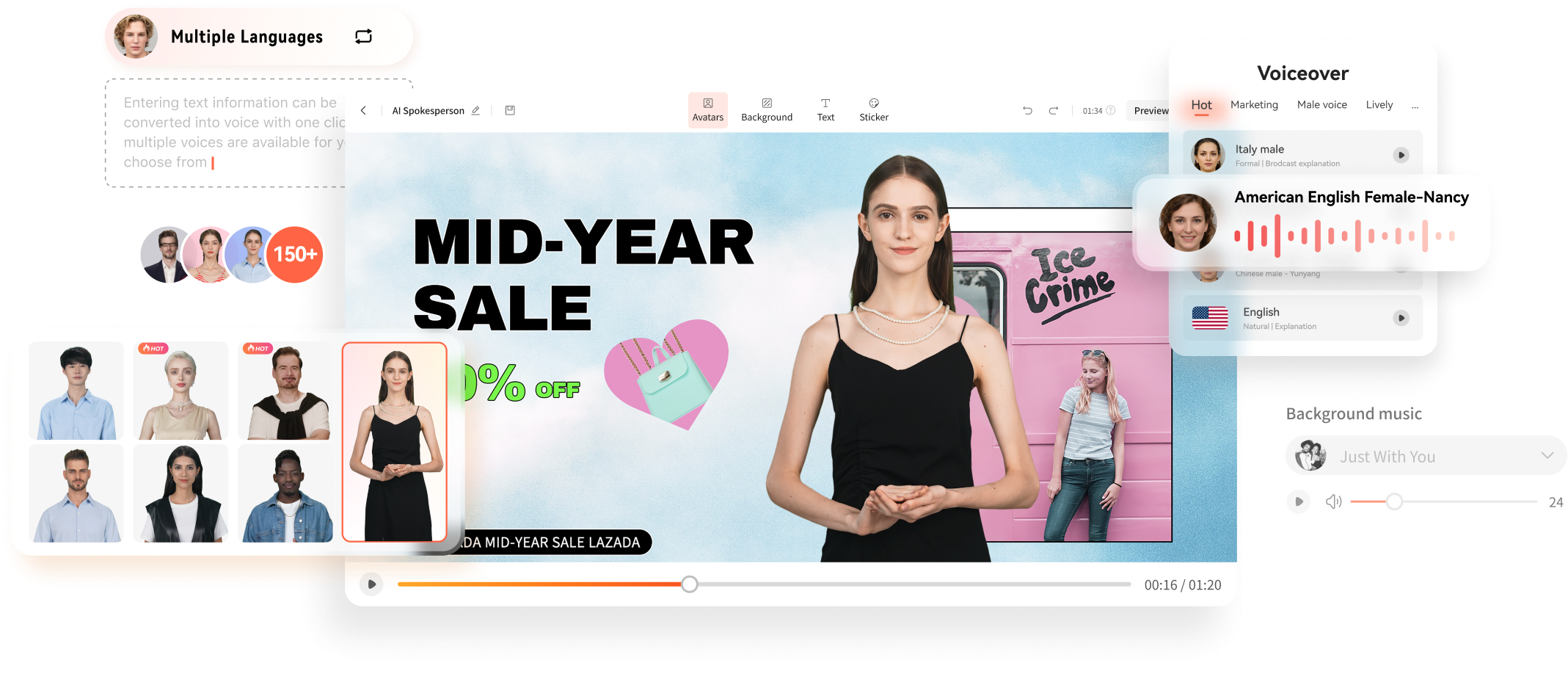
Get Started Online Free Download
- 24/7 content delivery. Whether taking a break or focusing on other tasks, Virbo Live ensures your stream continues with AI-powered content, keeping viewers entertained and informed.
- Virtual host template library. No more scrambling for guest hosts or struggling with solo presentations. Virbo Live’s diverse library of 150+ customizable AI avatars can be your virtual co-host, presenter, or even a captivating character, interacting with viewers, answering questions, and conducting interviews.
- Content creation is made easy with templates. Forget starting from scratch. Virbo Live provides 180+ professionally designed video templates across various themes and styles, saving you time and effort. Plus, enjoy a library of royalty-free music to add the perfect soundtrack.
- Engaging AI voices. Bring your content to life with 120 AI voices, offering a variety of tones and accents, ensuring your message resonates with a global audience.
Integrating AI into Your Live Stream
Adding Virbo Live to your existing setup is simple and intuitive. Add Virbo as a live OBS window and use the YouTube stream key. Here’s a step-by-step guide:
- Step 1: Install Wondershare Virbo or access the web app.
Get Started Online Free Download
- Step 2: ClickCreate a Blank Livestream Room to customize your stream’s interface.

- Step 3: Choose from templates, backgrounds, AI avatars, and stickers to create a visually engaging environment.

- Step 4: UnderScript Lines , write the script your AI host will deliver throughout the stream. UseAI Interaction to set responses for specific questions andHuman interaction for actual responses from your end.

- Step 5: Once everything is set, clickStart Livestream and connect it to your preferred platform through OBS. Paste your streaming key for seamless integration.
Use-Cases for Wondershare Virbo and Private YouTube Live Streaming
Virbo Live empowers you to explore new avenues in content creation. Imagine using it for:
- E-commerce shopping. Showcase products with AI hosts demonstrating their features and answering customer questions in real-time, even outside business hours.
- Educational live tutorials. Host interactive learning experiences with AI tutors delivering engaging lectures and responding to student inquiries.
- Live Q&A sessions. Let your AI host manage large-scale Q&A sessions and field questions and keep the conversation flowing smoothly.
With Wondershare Virbo Live, the possibilities are endless. Unleash your creativity, explore new ways to connect with your audience, and experience the power of 24/7private YouTube streams . Remember, this is just a starting point – personalize your content, experiment with different features, and discover the unique potential Virbo Live brings to your streaming journey.
Conclusion
In today’s digital age, live streaming has become a powerful tool for connecting with audiences in real-time. YouTube live streaming offers a versatile platform to share your passions and connect with a select group of viewers. This article has guided you through setting up aprivate live stream on YouTube , ensuring your content reaches only your guests.
Remember, key considerations include enabling private streaming within YouTube Studio, inviting viewers via email or link sharing, and personalizing your content to create an engaging experience. If you want to take your live streams to the next level, consider Wondershare Virbo, a user-friendly tool designed to simplify private live streaming on YouTube with the help of AI.
Create AI Avatar Video with AI Avatar | Wondershare Virbo Online
Create AI Avatar Videos
Simply clicking the AI Avatars showcased on the homepage, and initiate your video production process.
02 Edit Video
03 Export Video
Step 1. Choose AI Avatar
Select the AI avatar you like from those presented on the homepage.
Hover your mouse over the chosen avatar and pick your preferred video mode.
![]()
Choose AI Avatar
Step 2. Edit Video
Enter the user interface and start editing the video. You can also customize the voiceover, background, text style, and add stickers to the video.
![]()
Edit Video
Select “Music” to choose the video’s soundtrack. Browse through our extensive music library and adjust the volume to suit your individual preferences.
![]()
Choose Background Music
Step 3. Export Video
Once you finished producing the video, click “export” to generate the video.
![]()
Export Video
FAQs about AI Avatars
1Are These Avatars Based On Real Humans?
Yes, these avatars are all based on video footage using real actors.
2Can the Generated Videos with Digital Presenter Be Used for Commercial Purposes?
For free users, videos are not allowed to be used for commercial purpose. For subscribed users, all materials provided in the software are commercially available, and the produced videos containing digital humans are also available for commercial use. Subscribe now>
3Can I Control Avatars’ Gestures or Expressions?
For personalized avatars on Virbo, you can enjoy the liberty to craft gestures and expressions to your liking. Click now to explore Virbo’s Customization Service!
02 Edit Video
03 Export Video
Step 1. Choose AI Avatar
Select the AI avatar you like from those presented on the homepage.
Hover your mouse over the chosen avatar and pick your preferred video mode.
![]()
Choose AI Avatar
Step 2. Edit Video
Enter the user interface and start editing the video. You can also customize the voiceover, background, text style, and add stickers to the video.
![]()
Edit Video
Select “Music” to choose the video’s soundtrack. Browse through our extensive music library and adjust the volume to suit your individual preferences.
![]()
Choose Background Music
Step 3. Export Video
Once you finished producing the video, click “export” to generate the video.
![]()
Export Video
FAQs about AI Avatars
1Are These Avatars Based On Real Humans?
Yes, these avatars are all based on video footage using real actors.
2Can the Generated Videos with Digital Presenter Be Used for Commercial Purposes?
For free users, videos are not allowed to be used for commercial purpose. For subscribed users, all materials provided in the software are commercially available, and the produced videos containing digital humans are also available for commercial use. Subscribe now>
3Can I Control Avatars’ Gestures or Expressions?
For personalized avatars on Virbo, you can enjoy the liberty to craft gestures and expressions to your liking. Click now to explore Virbo’s Customization Service!
What Is Talking Avatar?
Part 1: Advantages of Talking Avatars
Talking avatars offer several advantages for communication:
1. Personalization: Avatars can be customized to reflect brand identity, creating a unique and memorable experience.
2. Engagement: Animated avatars capture attention and enhance user engagement in various contexts.
3. Multilingual Communication: AI-powered avatars can communicate in multiple languages, facilitating global outreach.
4. Accessibility: Avatars aid individuals with disabilities by providing text-to-speech communication.
Part 2: Applications of Talking Avatars
Talking avatars find applications in diverse fields:
1. Customer Service: Avatars provide instant responses and assistance, improving customer experience.
2. E-Learning: Avatars enhance online learning by delivering content through engaging interactive experiences.
3. Marketing: Avatars offer a novel way to present product information and promotional messages.
4. Virtual Assistants: Avatars act as AI-powered virtual assistants for tasks like appointment scheduling.
Part 3: Examples of Talking Avatars
Prominent examples of talking avatars include:
1. Replika: An AI chatbot that engages users in conversations and learns from interactions.
2. SitePal: A platform that offers customizable avatars for websites, enhancing user engagement.
3. Mycroft AI: An open-source voice assistant that utilizes an avatar for user interactions.
4. Soul Machines: Creating highly realistic avatars for various applications, including customer service.
Conclusion
In conclusion, talking avatars are revolutionizing communication across industries. Their ability to engage, educate, and provide personalized interactions presents exciting opportunities for businesses and individuals. As technology advances, talking avatars are expected to play an increasingly significant role in shaping the way we communicate and engage online.
Part 1: Advantages of Talking Avatars
Talking avatars offer several advantages for communication:
1. Personalization: Avatars can be customized to reflect brand identity, creating a unique and memorable experience.
2. Engagement: Animated avatars capture attention and enhance user engagement in various contexts.
3. Multilingual Communication: AI-powered avatars can communicate in multiple languages, facilitating global outreach.
4. Accessibility: Avatars aid individuals with disabilities by providing text-to-speech communication.
Part 2: Applications of Talking Avatars
Talking avatars find applications in diverse fields:
1. Customer Service: Avatars provide instant responses and assistance, improving customer experience.
2. E-Learning: Avatars enhance online learning by delivering content through engaging interactive experiences.
3. Marketing: Avatars offer a novel way to present product information and promotional messages.
4. Virtual Assistants: Avatars act as AI-powered virtual assistants for tasks like appointment scheduling.
Part 3: Examples of Talking Avatars
Prominent examples of talking avatars include:
1. Replika: An AI chatbot that engages users in conversations and learns from interactions.
2. SitePal: A platform that offers customizable avatars for websites, enhancing user engagement.
3. Mycroft AI: An open-source voice assistant that utilizes an avatar for user interactions.
4. Soul Machines: Creating highly realistic avatars for various applications, including customer service.
Conclusion
In conclusion, talking avatars are revolutionizing communication across industries. Their ability to engage, educate, and provide personalized interactions presents exciting opportunities for businesses and individuals. As technology advances, talking avatars are expected to play an increasingly significant role in shaping the way we communicate and engage online.
Also read:
- [New] 2024 Approved VR Today's Core Technologies
- [New] In 2024, Startup's Best Friends The 8 Products Every Entrepreneur Should Collect
- [New] Screen Capture Face-Off Battle of the Best, OBS or Bandicam
- 2024 Approved Journey to Audio Excellence Mastering iOS-Based Recording Techniques
- Ad-Funded VLC Media Player: Introducing Free Streaming with Supporting Ads
- Calculating 20MB Video Length in Secs
- Easy Guide to Poco C65 FRP Bypass With Best Methods
- How to Unlock iPhone 12 Pro Online? Here are 6 Easy Ways
- In 2024, Best 10 Chinese Video to English Translator
- In 2024, How to Detect and Stop mSpy from Spying on Your Oppo A56s 5G | Dr.fone
- In 2024, Safeguarding Photos Best Software Guide Uncovered
- In 2024, The Ultimate Guide to B2B Video Marketing
- New 2024 Approved Top 4 Elon Musk Voice Generator Programs to Make You Sound Like the Billionaire
- New Create AI Avatar Videos | Wondershare Virbo Online for 2024
- New In 2024, AI Script Generator | Virbo Guide
- New What Is an AI Presentation Maker, In 2024
- New What Is an AI Voice Generator? | Wondershare Virbo Glossary
- Updated Power of AI Thumbnail Generators
- What Is Talking Avatar, In 2024
- Title: In 2024, AI Script Generator | Virbo Guide
- Author: Sam
- Created at : 2024-10-02 16:39:14
- Updated at : 2024-10-08 19:04:36
- Link: https://ai-voice-clone.techidaily.com/in-2024-ai-script-generator-virbo-guide/
- License: This work is licensed under CC BY-NC-SA 4.0.